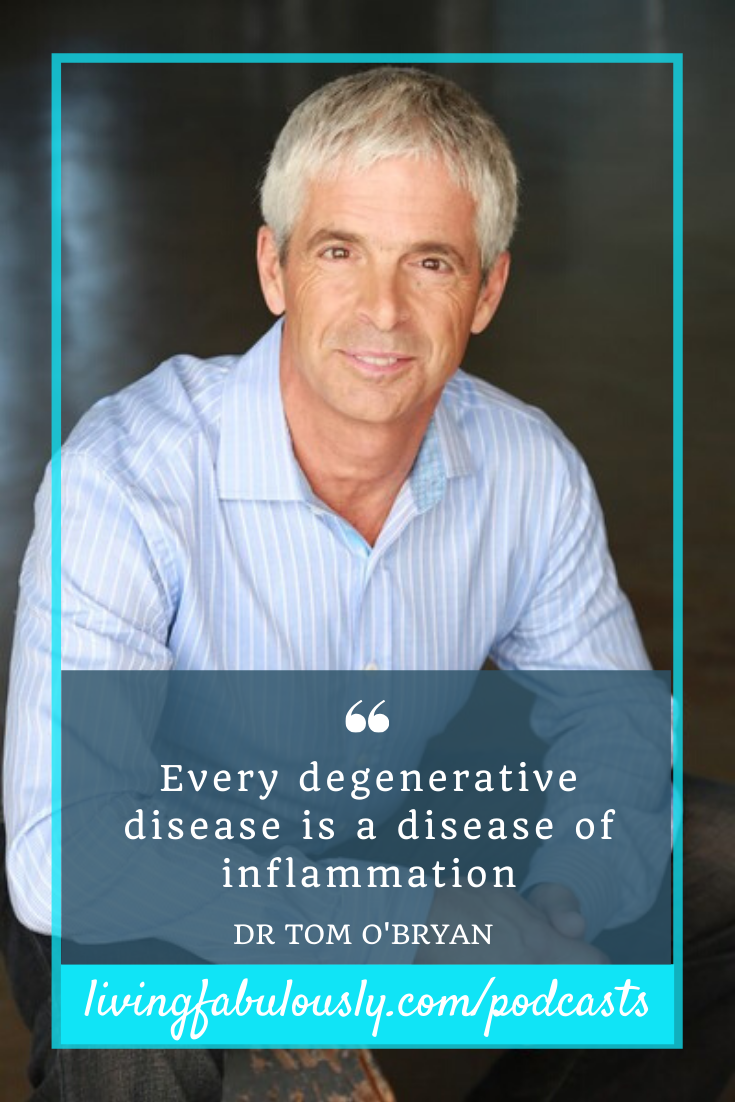“The most common source of inflammation is what’s on the end of your fork. And the most common food is wheat, triggering inflammation across the board for everyone”
If you’ve ever wondered if gluten is affecting you, the answer is a resounding yes. It impacts everyone all of the time as it makes the gut lining permeable.
This means what belongs in the gut ends up entering the blood stream and can set off a cascade of inflammatory reactions in any part of the body.
Dr Tom O’Bryan says if you get gut issues when eating gluten you’re one of the lucky ones. We explore why not having gut symptoms doesn’t mean you’re not affected by gluten.
Inspire yourself with these essential insights from Dr Tom O’Bryan
We spoke about
Why gluten related disorders are the silent epidemic
Gluten’s systemic impact on our body
The difference between coeliac disease and gluten sensitivity
Why the tests for gluten sensitivity often wrong
The link of gluten sensitivity to osteoporosis
Dr Tom’s tips for Living Fabulously
If you got value from this episode if you have not yet done so please Subscribe, Rate and Review on iTunes or Stitcher. You can follow the instructions here. If you know someone else that would get value from this episode as well please share it with them.
Until next time fabulous podcast listener, I’m Bev and I invite you to live the fab life with me now!
Partial Transcript
Bev Roberts 3:00
Why do you believe gluten related disorders are a silent epidemic?
Dr Tom 3:27
Well, it's silent because people don't want to hear it. You know, there are depending on what experts you talk to, there are five stages of change, or six stages of change that the first one is basically denial. You know, I don't want to hear that. And with wheat.
Wheat is the most common food that most people eat multiple meals every day. Toast for breakfast. Sandwich for lunch. Pasta for dinner. Croutons on the salad, a piece of pie, a cookie, a sandwich for lunch, flour in the soup to thicken it up, or in the gravy that we're getting exposure to wheat, most every day.
And if you travel, when you're in the airports, it's very difficult to find something to eat of substance, if it's not wheat based, that our societies are completely dependent, currently on this food source. And so it's become such a part of living on the planet for all of us. I know that you're in Australia and so you know, there's a slang term in the US that I'll use it's as American as apple pie. You know that wheat is just, it's a food for humanity. And we all believe that because it's the staff of life.
We've heard so many terms for it. It's difficult for people. And usually people have to get sick enough. And when everything they've tried hasn't worked, and they're just so sick and the medications are helping a little, but they're still suffering, that then they might listen. And, you know, every disease that we get every degenerative disease, as far as I know, every degenerative disease is a disease of inflammation.
At the cellular level, the cell is on fire. So the question is, is that a brain cell or a kidney cell? You know, is it Alzheimer’s or kidney stones or is it rheumatoid arthritis in your joints or psoriasis on your skin? Is it depression in your brain? Or is it liver disease. So is it your brain or your kidneys? And is it gasoline or kerosene, but the cell is always on fire. And the most common source of inflammation in your body, every physician agrees with this, for the general public.
You know, if you live in a house that's mouldy, you're there 15 hours a day, every day breathing and mould. That's the most common source of inflammation for you personally, but for most of us, in general, the most common source of inflammation is what's on the end of your fork. And the most common food is wheat, triggering inflammation across the board for everyone. And people have a hard time hearing this, but well, but it's the staff of life. You know, I mean, it's in the Bible. Give us this day our daily bread. But the next sentence is but forgive us our trespasses, right? You know you read a little deeper into it. But now we know that I'll stop being cute.
Now we know the science is so clear. It's irrefutable. When you read the science, absolutely no one can question this because there are so many studies now, if our doctors read the studies, but they don't have time to read the studies, but it is without question every human. Every time they eat wheat, they get transient intestinal permeability, every human every time. So I want to explain that concept. I'm going to get a little geeky, but so that people understand this…
Episode Links
You can find Dr Tom O’Bryan at:
Website http://www.thedr.com
Facebook https://www.facebook.com/thedr.com.english/
The Gluten Summit - 29 Leading Health Experts Gathered to Prove to the World that it MUST ask “Could Health Issues Be Caused by Gluten?” https://thedr.com/tgs/
For other episodes with Dr Tom O'Bryan head to:







